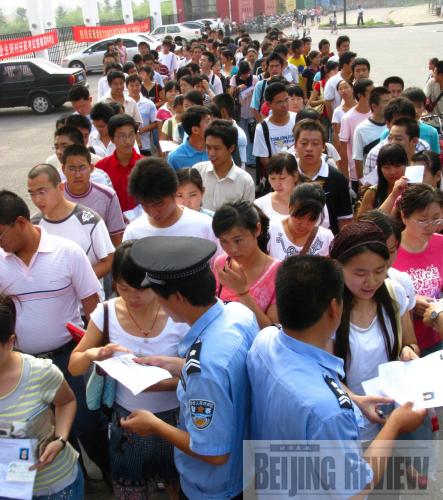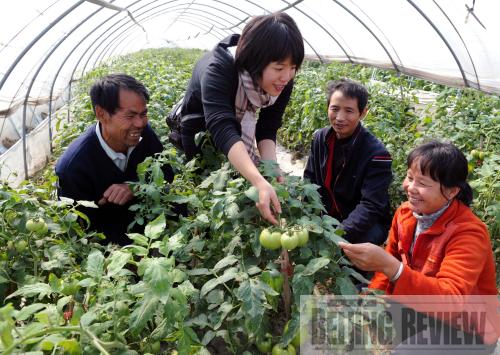|
 |
|
STIFF COMPETITION: College graduates wait in long lines to take the exam to become village officials in Handan, Hebei Province, on July 12, 2008 (WANG JIUZHONG) |
Lu Chengtian moved to Wali, a village in Mafang Town, Beijing's Pinggu District, in 2006 to take up a post as the assistant to the village Party secretary. Villagers held a small welcoming ceremony upon his arrival. Lu, fresh out of China Agricultural University, told those who had gathered that he had already made plans for the coming three years.
He announced that he wanted to turn the village into an exporter of fresh herbs, which would help villagers increase their income by four or five times.
 |
|
TEACHING AND LEARNING: Ouyang Hui (second from left), a postgraduate from East China Normal University, teaches villagers about better methods for growing tomatoes. She chose to go back to a village near her hometown in Jiangxi Province as an official (ZHOU KE) |
The recent graduate had gained valuable experience helping his professor plant herbs and had developed distribution channels. He was confident that the project would be a success.
Officials have learned that youthful excitement and energy like Lu's is a precious resource that can be tapped to help Chinese society. In 2006, villages in Beijing's suburbs welcomed 2,000 college graduates as village officials. These young people, who went to work straight from their Beijing universities, are expected to stay in their adopted homes for three years to promote development using the knowledge they gained in college. Each village was assigned at least two graduates. Since 2006, more and more have signed on to serve in the countryside.
When Lu tried to put this herb export idea into practice, the obstacles were beyond what he imagined. He did not know where to get the farmland; all the village's real estate was already occupied by homes. Since villagers did not know whether he would succeed, they were loath to spare any land for the experiment.
The head of the village finally agreed to spare a tiny patch of land for Lu, who then found that he had to do all the work on the farmland, including purchasing the seeds and irrigating and fertilizing it. "The work was not too hard to bear. What disappointed me was that no one offered to help. They didn't trust me," he said.
As the village official in charge of promoting agricultural techniques and improving production, Lu thought he would be surrounded by residents and answering their questions about new farming methods. That was his definition of village officials before he arrived.
| 